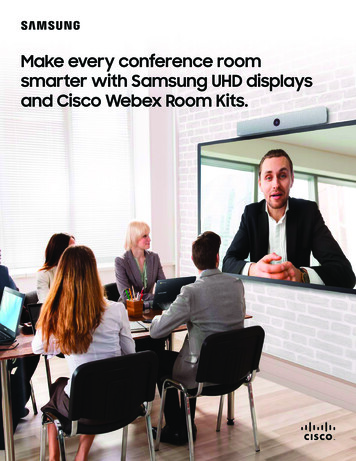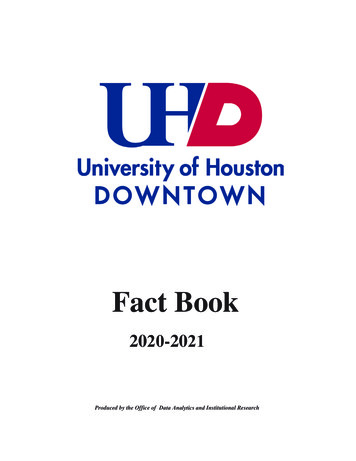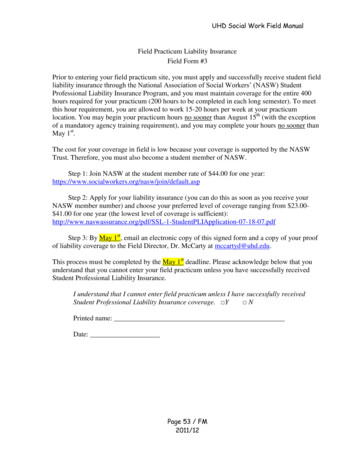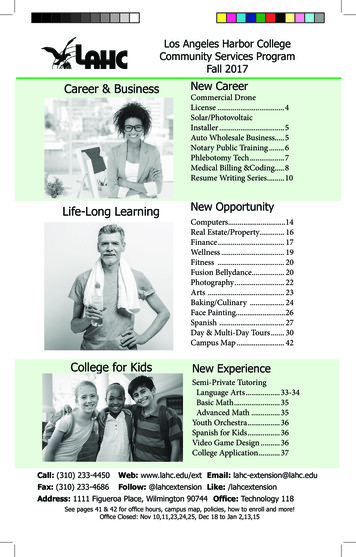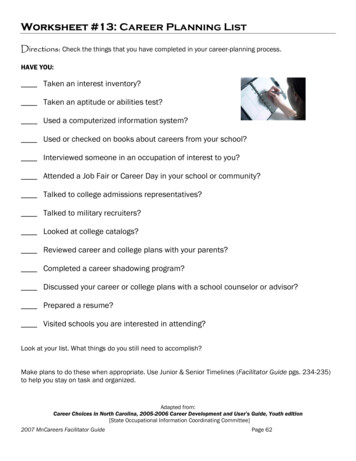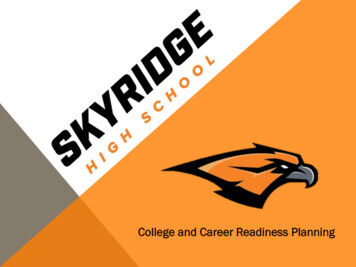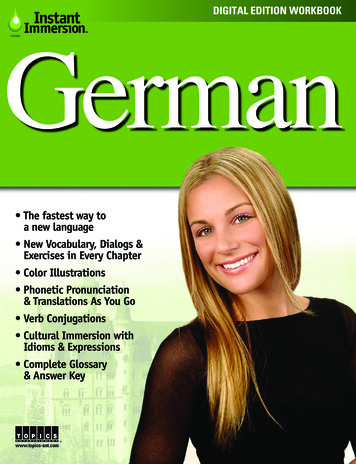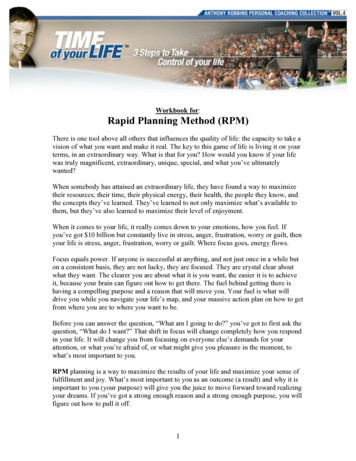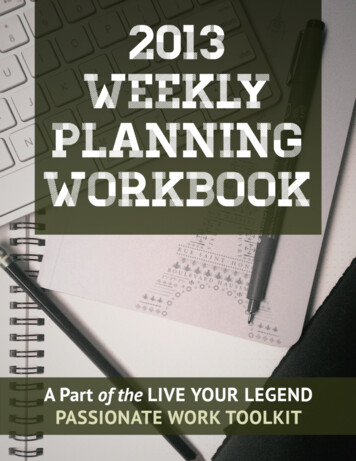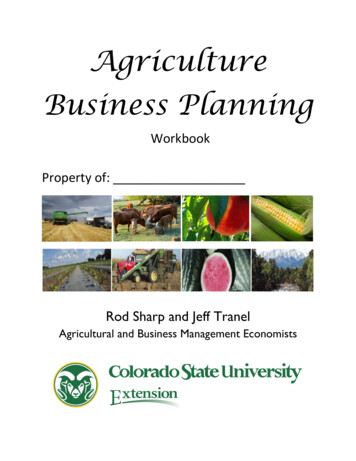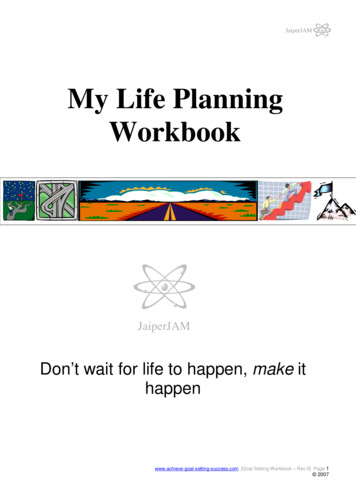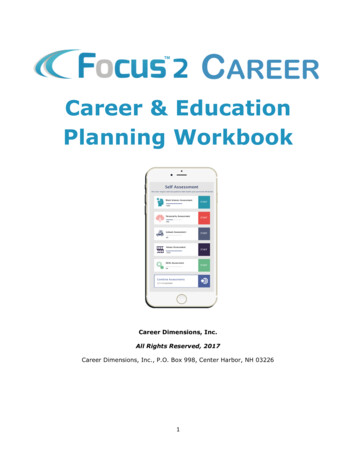
Transcription
Career & EducationPlanning WorkbookCareer Dimensions, Inc.All Rights Reserved, 2017Career Dimensions, Inc., P.O. Box 998, Center Harbor, NH 032261
TABLE OF CONTENTSIntroduction to FOCUS 2 CAREER3Setting Up your FOCUS 2 CAREER Account5Snapshot of the FOCUS 2 CAREER Main Menu6Introduction to the Career & Education Planning Process7Understanding Your FOCUS 2 CAREER Portfolio Results12Help from Coaches: Coping With Obstacles and Concerns21Create a Plan to Achieve your Objectives22Journaling Exercises24Conclusion262
INTRODUCTION TO FOCUS 2 CAREERWhat is FOCUS 2 CAREER?FOCUS 2 CAREER is an online interactive, self-guided career and education planning system designed to help youmake decisions about your future career goals and education plans.FOCUS 2 CAREER will guide you through an interactive process that will:1. Assess your career planning readiness, work interests, values, skills, personality type and leisure timeinterests.2. Broaden your career options and discover occupations matching your personal preferences andattributes.3. Discover and explore career fields, majors and training programs that are best for you.4. Plan a career and educational pathway that will support your personal needs and goals.3
WHEN SHOULD YOU USE FOCUS 2 CAREER?Use FOCUS 2 CAREER throughout your college years and as an alumnus. FOCUS 2 CAREER can be used in differentways throughout all stages of your education and career planning according to your needs.Career Planning for 1st and 2nd Year Students: Understand the career planning process Learn about yourself through self assessments by using FOCUS 2 CAREER Take exploratory classes to learn about the majors at your college Explore career fields and occupations that appeal to you Consult with your career coaches, academic success coaches, academic advisors, mentors Learn about and plan for activities that will support your decision making and career development(internships, externships, volunteer opportunities, part time jobs, study abroad)Career Planning Upper Classman and Alumni Students: Continued career exploration and awareness, use FOCUS 2 CAREER as an ongoing resource Support your career development through internships, volunteering, cooperative learning, leadershiproles Consult with your career coaches, academic success coaches, academic advisors, mentors Make career plans, develop your resume and cover letters, network, develop a rapport with faculty inyour major, plan for letters of recommendation, develop interviewing skills, conduct informationalinterviews Plan for advanced education and training, entrance tests, certifications Make informed decisions about your major and careerHOW MUCH TIME WILL IT TAKE ME TO USE FOCUS 2 CAREER?Typically, the time spent by students the first time they use FOCUS 2 CAREER ranges from 1-2 hours. Of course,you can spend as much time as you need. My Career Planning Readiness & Self Assessments of FOCUS 2 CAREERcan usually be completed in approximately 30-45 minutes. FOCUS 2 CAREER has up to date, detailed informationabout over 1,000 different occupation choices and majors. A good strategy is to use FOCUS 2 CAREER, then thinkabout your results and discuss your ideas with your career coach and then return to use FOCUS 2 CAREER as anongoing resource. You can use FOCUS 2 CAREER throughout your academic years and as an alumnus.4
SETTING UP YOUR FOCUS 2 CAREER ACCOUNTHOW TO SET UP YOUR ACCOUNT AND LOG BACK INTO FOCUS 2 CAREERNew Users:Create your account by linking to your college’s FOCUS 2 CAREER self registration cfm?SID 1462Your college’s Access Code: UHDGatorsReturning Users:You can log back into your FOCUS 2 CAREER account with your username and password at any time.If you forget your user name and/or password, go to the FOCUS 2 CAREER login page and click on the link thatsays “If you have forgotten your username or password, click here”.THINGS TO KEEP IN MIND Use FOCUS 2 CAREER on any device, including all computers, phones, tablets, etc. (No apps to load). FOCUS 2 CAREER always saves your assessment results Use FOCUS 2 CAREER as often as you wish You can change your mind about earlier choices, repeat a section and explore new options Your results are stored online and are always available to you and your career coach Use the various features of FOCUS 2 in any order Save the occupations and majors that most appeal to you Seek the expert advice of your career coach to enhance your career planningA snapshot of the Main Menu of FOCUS 2 CAREER appears on the next page. The layout of the FOCUS 2 CAREERdashboard mirrors the steps of the career planning process. Most students start at the top of the dashboard andthen work down through the FOCUS 2 CAREER tools.5
6
INTRODUCTION TO THE CAREER PLANNING PROCESSTHE CAREER & EDUCATION PLANNING PROCESSFrank J. Minor, Ph.D.Associate Professor, Emeritus, Saint Anselm College, NHCareer Dimensions, Inc., Copyright 2012, 2017WHY CAREER PLANNING IS NECESSARYIn today's rapidly changing world, new career paths are constantly unfolding, traditional ones are being changedand shifts are taking place in occupation skills and educational requirements. These changes are a result of newtechnology, modifications in organizational design and the trend towards global business operations. With allthese changes, you might ask "What is the point of planning ahead by developing a career plan?" The point is tobe ready for change with a set of career goals, strategy and options based on your interests, personality, valuesand skills. Once you have a plan, you will be equipped to manage your career and take advantage of changes inthe economy and job market rather than becoming a victim of change.WHO IS RESPONSIBLE FOR PLANNING AND MANAGING YOUR CAREER?Planning your career is totally your responsibility. It is up to you to do the planning and take the necessary actionsto obtain the education and training that will support your career plans. However, you can get help. For example,your career coach, academic success coach, and advisor can advise you about Your career planning strategy How to find information you need How to get around obstacles How to go about planning your current and long term education and trainingKeep in mind, throughout your life, you are the one who must make all the decisions about your career and youmust produce the results that support your goals. It’s up to you to control and navigate your own destiny.7
THE IMPORTANCE OF SELF ASSESSMENTUnderstanding yourself is a critical aspect of career and educational exploration and planning. The more youknow about your career related interests, values, skills, personality type and preferences, the better equipped youwill be to identify the career fields, major areas of study and training programs, and education pathways that arecompatible with your personal attributes. The FOCUS 2 CAREER system will help you develop an accurate selfassessment of your personal qualities: Your Work Interests are a reflection of the kinds of work related activities and tasks you most enjoydoing. Your Personality Type is a description of how you react to certain situations and people and how youmake decisions, organize information and go about solving problems. Your Values are a description of what is most important to you in your life. For example, you might valueearning a lot of money, helping other people, being creative and artistic, having a secure and steady job,etc. Your Skills are a reflection of your talents and the types of things you easily learn and perform well. Your Leisure Time Interests are a reflection of the kinds of leisure related activities you most enjoy doing.THE BIG PICTURE: YOUR LIFE PLANIt is a good idea to plan your career based on the big picture, that is, your life plan. Ask yourself, “What kind oflife do I want to lead?” As you can imagine, your career decisions will dramatically impact your lifestyle. Youroccupation will influence your income work hours travel job security colleagues and friends8
leisure time where you liveQuestions you need to ask yourself about your life plan are: What principles am I committed to as a person? I.e. family, security, prestige, accomplishments, etc. What kinds of experiences do I want in my life? I.e. travel, adventure, cultural, etc. What personal talents do I want to develop? I.e. music, art, language, communication, intellectual, etc. How do I like to spend my leisure time? I.e. community services, recreation and sports, travel, etc.Finally, you must ask yourself whether the occupational goals and educational avenues you are considering will besupportive of your life plan.ROLES YOU PLAY IN YOUR LIFEBeing a worker will be interconnected with other roles you play in life. Examples of roles that are affected by yourcareer could include being a parent, a community citizen, a student, a recreationist. Your career reaches beyondbeing a wage earner in your chosen occupation. For example, an easy way to see how your choice of anoccupation affects your future roles is to consider the following scenario. If you were to be a wage earner, parent,and student then clearly your occupational income must be sufficient to pay for the expenses incurred in theseother roles. Most people are primarily involved with two or three roles at a time. Which roles you are focusingon depends upon your age and life stage. For example, in college, your principle roles may be as student andrecreationist. Later in life your principle roles may be as worker and parent. The point is that throughout your lifeyou will play a combination of work, leisure, study, homemaking and citizen roles that are intermixed. Thereforewhen you make decisions about your career, you should take into consideration the effect of these careerdecisions on your other areas of your life.THE LIFE-CAREER RAINBOWRefer to the Life-Career Rainbow Chart below to get a better picture of the kind of roles you may play at variousages and stages of your career and life.The two outer arcs of the Life-Career Rainbow show you the Life Stages you may move through during your careerand life, and your approximate age in each. The lower arcs of the Life-Career Rainbow show you the differentroles you may engage in while in different Life Stages and Ages.9
SUMMING IT ALL UPHere is how to take the ‘Big Picture’ into consideration when making career and education plans:First, when choosing an occupation, think about which of your options will most likely provide you with selffulfillment in all your roles, not only in the present, but in the future.Second, periodically dust off your career plans, take stock of yourself and what’s happening in your life, and thenmake adjustments in your career as needed. For example, changes in your career field may require that you learnnew skills, or changes in your personal interests or values or social or family situations may affect your careeraspirations, etc.BENEFITS OF HAVING A CAREER PLANOnce you have established your career goals you will be better able to make choices about your college major andminor areas of study and the courses you should take. Your career goals will also enable you to make decisionsabout personal developmental activities while in college such as internships, volunteer work and summer jobs.Research has shown that there are many significant advantages and benefits of having career plans. Collegestudents with career plans: Are less likely to make costly changes in their college education plans and are more likely to graduate ontime. Are more confident and satisfied with their choice of an occupation and major area of study.10
Achieve higher college grades because their decisions about their education path are compatible with andare based on their personal interests, values and abilities. Earn higher incomes in their entry jobsWhile in college, it’s a good idea to map out an action plan that leads you to your goals. The plan can serve as areference that you and your advisors can monitor and adjust as needed.SEEKING EXPERT ADVICE: CAREER COUNSELINGIn conjunction with using FOCUS 2 CAREER, you may want to meet with a career coach, academic success coach,or mentor.Be prepared to summarize and ask questions concerning: Your career related interests, values, personality and abilities. Your present occupational, educational and college/training goals and plans. Responsibilities or obstacles that are interfering with your career and college/training decision making. Your life plan, life style desires and strategy to achieve your goals.Your career advisor can give you ideas and information to help you: Verify the rationale of your career decisions and education plans. Help you develop your long term educational pathway. Pinpoint your personal development needs that are important for you to achieve your goals. Suggest ways to get around any obstacles that are interfering with your decision making and planning. Formulate strategies and action plans to achieve your career and educational objectives.Career Planning is a lifelong process of exploration and planning of your career and educational goalscompatible with your interests, values, talents, personality and aspirations. It involves thinking about whicheducational and occupational paths will provide you with satisfaction and fulfillment in all aspects of your life,present and future.11
UNDERSTANDING YOUR FOCUS 2 CAREER PORTFOLIO RESULTSAfter you use FOCUS 2 CAREER, it can be beneficial to review and discuss your FOCUS 2 CAREER results with yourcareer coach. The following module will help you to understand and use your results.Be sure you have saved your favorite occupations and majors. By eliminating or saving occupations and majorsyou are making decisions. Narrative descriptions of your attributes are included in each of the assessment resultsand are summarized in your career portfolio. You should have a good understanding of your career relevantattributes and how they will be an asset to you in the world of work. Your assessment summaries can be helpfulto refer to while writing cover letters or preparing for interviews.Refer to your FOCUS 2 CAREER Portfolio results as you complete the following exercises.MY CAREER PLANNING READINESS ASSESSMENTThe My Career Planning Readiness assessment measures your level of involvement in activities that support selfawareness, career exploration and your satisfaction with your career planning. Your results are displayedgraphically and verbally. Self Assessment (Self) It is important that you are actively involved in self assessment because it is themost important and the first step in career planning. Career Exploration (Exploration) It is important that you are actively involved in career explorationbecause it will help you to discover and understand career options. Career Planning Satisfaction (Planning) Your career planning satisfaction reflects how ready you are toengage in career planning activities. Obstacles that could interfere with your ability to plan could befinancial, family responsibilities, etc. If your Planning score is low it would be wise for you to seek helpfrom a career coach to help you resolve your planning concerns.What support services are available to you at your college to assist you with career planning readiness?12
What action steps will you take to increase your scores in your career planning status assessment?ACADEMIC STRENGTHSWhat is your action plan to take advantage of your academic strengths and address any academic weaknessesthat could impact your education plans and future career?SELF ASSESSMENTSeveral self assessments are available to you in FOCUS 2 CAREER. The results of each self assessment includesoccupations and supporting majors at your college that match your personal attributes. Self Assessment is animportant first step in selecting a major, choosing an occupation, planning your career and doing a job search.Pay attention to the descriptions of your personal attributes in each of your self assessments. Being able toarticulate and discuss your work interests, values, personality type and skills to a potential employer is animportant part of a fruitful job search.Work Interest Assessment: The FOCUS 2 CAREER work interest assessment identifies and matches your workinterests to occupations and supporting majors at your college. The bar graph displayed in your results shows thestrength of each of your work interests.Historically, the assessment of work interests has been the focal point of the career planning process. The workinterest assessment measures your self reported career interests using a nationally recognized standardizedinstrument using the RIASEC scales developed by John Holland. In the sample graph below the top 3 workinterests are Investigate, Realistic, and Artistic (IRA). A person’s top 3 work interests make up their Holland Code13
and can be matched to occupations that have similar Holland Codes.SAMPLE WORK INTEREST PROFILEThe HollandCode for thissample is IRA(Investigative,Realistic, andArtistic)The average score for each work interest is also shown as a number ranging from 0 to 100 where0 Low Interest50 Moderate Interest100 High InterestThe descriptions below the bar graph summarize each of the Holland Code work interestsInvestigative: "The Thinkers"People in the investigative category often have a strong desire to understand cause and effect, and solve puzzles andproblems. They often work in jobs that are scientific in nature. Their work often involves the analysis of data, using formulas,graphs and numbers. Investigative types typically prefer to work independently, and with minimum supervision. People inthis category generally enjoy using computers, solving math problems, interpreting formulas, and thinking abstractly.Enterprising: "The Persuaders"People in the enterprising category often prefer activities selling and promoting. They enjoy influencing others and being in aleadership position. They often use their skills to influence others. They often like competitive activities and are often selfconfident, talkative and energetic. They generally enjoy discussing politics, selling and promoting, having power and status,giving talks and speeches, and leading groups.Realistic: "The Doers"People in the realistic category often prefer to work with objects and things. They are likely to enjoy creating things with theirhands and using tools and machines. Some prefer large, powerful machines like tractors, while others prefer precisionmachinery such as X-ray or electronic equipment. People in this category generally enjoy being physically active, repairingequipment, rebuilding cars, fixing electrical things, solving mechanical problems, playing sports, working outdoors, and usingtheir hands.Social: "The Helpers"People in the social category prefer to work with others. They tend to be highly verbal, express themselves well, and getalong well in groups. Social types typically prefer the team approach to problem solving. People in the social category oftendescribe themselves as cooperative, friendly, and understanding. They generally enjoy teaching, caring for others,volunteering, mediating disputes, meeting new people, and working in groups.Artistic: "The Creators"14
People in the artistic category prefer to be expressive. They like the opportunity to create new things and be innovative. Theytypically do not like structure or conformity. They prefer to use their imagination and be creative. People in this categorygenerally enjoy activities such as: writing, poetry, photography, designing, singing, acting, dancing, painting, attendingtheaters and exhibits, and reading.Conventional: "The Organizers"People in the conventional category often prefer orderly, systematic work. Work tasks often include keeping records, andorganizing written and numerical materials according to a plan. They like to see things run
Career Dimensions, Inc., P.O. Box 998, Center Harbor, NH 03226 . 2 TABLE OF CONTENTS Introduction to FOCUS 2 CAREER 3 Setting Up your FOCUS 2 CAREER Account 5 Snapshot of the FOCUS 2 CAREER Main Menu 6 Introduction to the Career & Education Planning Process 7 . College students with career plans:
